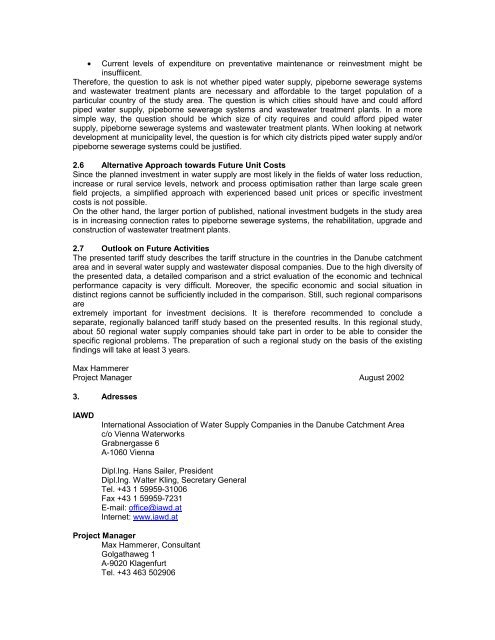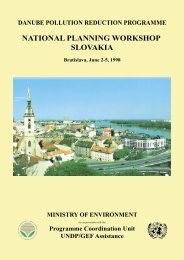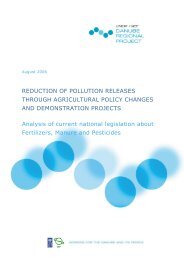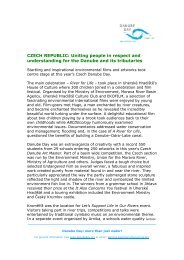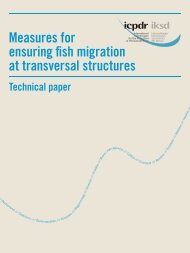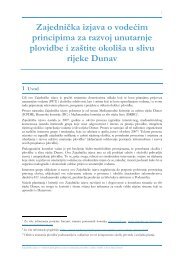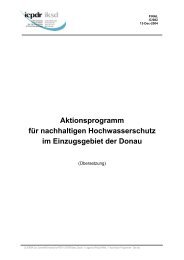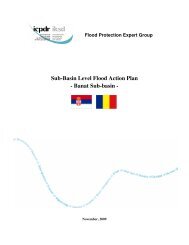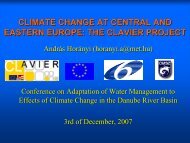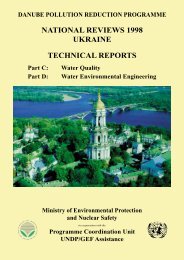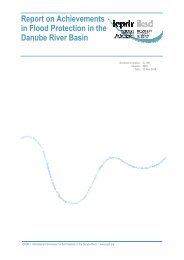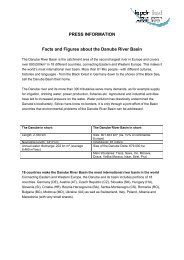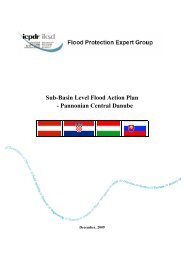Tariff Study Executive Summary - ICPDR
Tariff Study Executive Summary - ICPDR
Tariff Study Executive Summary - ICPDR
Create successful ePaper yourself
Turn your PDF publications into a flip-book with our unique Google optimized e-Paper software.
• Current levels of expenditure on preventative maintenance or reinvestment might be<br />
insuffiicent.<br />
Therefore, the question to ask is not whether piped water supply, pipeborne sewerage systems<br />
and wastewater treatment plants are necessary and affordable to the target population of a<br />
particular country of the study area. The question is which cities should have and could afford<br />
piped water supply, pipeborne sewerage systems and wastewater treatment plants. In a more<br />
simple way, the question should be which size of city requires and could afford piped water<br />
supply, pipeborne sewerage systems and wastewater treatment plants. When looking at network<br />
development at municipality level, the question is for which city districts piped water supply and/or<br />
pipeborne sewerage systems could be justified.<br />
2.6 Alternative Approach towards Future Unit Costs<br />
Since the planned investment in water supply are most likely in the fields of water loss reduction,<br />
increase or rural service levels, network and process optimisation rather than large scale green<br />
field projects, a simplified approach with experienced based unit prices or specific investment<br />
costs is not possible.<br />
On the other hand, the larger portion of published, national investment budgets in the study area<br />
is in increasing connection rates to pipeborne sewerage systems, the rehabilitation, upgrade and<br />
construction of wastewater treatment plants.<br />
2.7 Outlook on Future Activities<br />
The presented tariff study describes the tariff structure in the countries in the Danube catchment<br />
area and in several water supply and wastewater disposal companies. Due to the high diversity of<br />
the presented data, a detailed comparison and a strict evaluation of the economic and technical<br />
performance capacity is very difficult. Moreover, the specific economic and social situation in<br />
distinct regions cannot be sufficiently included in the comparison. Still, such regional comparisons<br />
are<br />
extremely important for investment decisions. It is therefore recommended to conclude a<br />
separate, regionally balanced tariff study based on the presented results. In this regional study,<br />
about 50 regional water supply companies should take part in order to be able to consider the<br />
specific regional problems. The preparation of such a regional study on the basis of the existing<br />
findings will take at least 3 years.<br />
Max Hammerer<br />
Project Manager August 2002<br />
3. Adresses<br />
IAWD<br />
International Association of Water Supply Companies in the Danube Catchment Area<br />
c/o Vienna Waterworks<br />
Grabnergasse 6<br />
A-1060 Vienna<br />
Dipl.Ing. Hans Sailer, President<br />
Dipl.Ing. Walter Kling, Secretary General<br />
Tel. +43 1 59959-31006<br />
Fax +43 1 59959-7231<br />
E-mail: office@iawd.at<br />
Internet: www.iawd.at<br />
Project Manager<br />
Max Hammerer, Consultant<br />
Golgathaweg 1<br />
A-9020 Klagenfurt<br />
Tel. +43 463 502906


